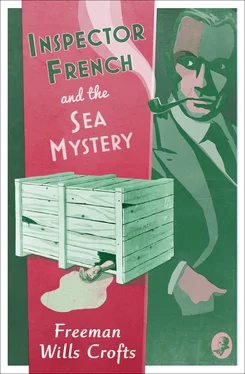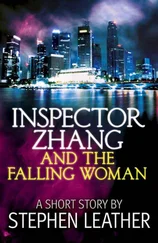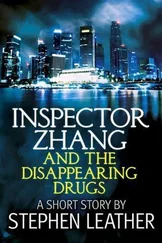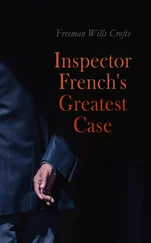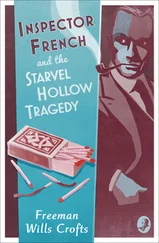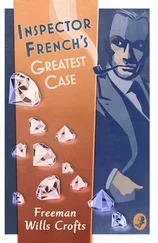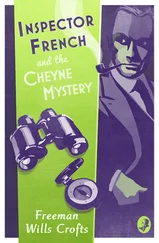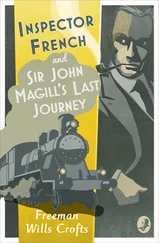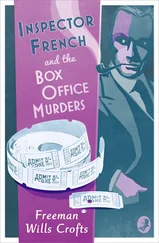What those investigations were to consist of was the problem which confronted French when after lunch he sat down in the deserted smoking-room of the little hotel to think matters out.
In the first place there was the body. What lines of inquiry did the body suggest?
One obviously. Some five or six weeks previously a fairly tall, well-built man of middle-age had disappeared. He might merely have vanished without explanation, or more probably, circumstances had been arranged to account for his absence. In the first case information should be easily obtainable. But the second alternative was a different proposition. If the disappearance had been cleverly screened it might prove exceedingly difficult to locate. At all events, inquiries on the matter must represent the first step.
It was clearly impossible to trace any of the clothes, with the possible exception of the sock. But even from the sock French did not think he would learn anything. It was of a standard pattern, and the darning of socks with wool of not quite the right shade was too common to be remembered. At the same time he noted it as a possible line of research.
Next he turned his attention to the crate, and at once two points struck him.
Could he trace the firm who had made the crate? Of this he was doubtful: it was not sufficiently distinctive. There must be thousands of similar packing cases in existence, and to check up all of them would be out of the question. Besides, it might not have been supplied by a firm. The murderer might have had it specially made, or even have made it himself. Here again, however, French could but try.
The second point was: How had the crate got to the bottom of the Burry Inlet? This was a question that he must solve, and he turned all his energies towards it.
There were here two possibilities. Either the crate had been thrown into the water and had sunk at the place where it was found, or it had gone in elsewhere and been driven forward by the action of the sea. He considered these ideas in turn.
To have sunk at the place it was thrown in postulated a ship or boat passing over the site. From the map, steamers approaching or leaving Llanelly must go close to the place, and might cross it. But French saw that there were grave difficulties in the theory that the crate had been dropped overboard from a steamer. It was evident that the whole object of the crate was to dispose of the body secretly. The crate, however, could not have been secretly thrown from a steamer. Whether it were let go by hand or by a winch, several men would know about it. Indeed news of so unusual an operation would almost certainly spread to the whole crew, and if the crate were afterwards found, someone of the hands would be sure to give the thing away. Further, if the crate were being got rid of from a steamer it would have been done far out in deep water and not at the entrance to a port.
For these reasons French thought that the ship might be ruled out, and he turned his attention to the idea of a row-boat.
But here a similar objection presented itself. The crate was too big and heavy to be dropped from a small boat. French tried to visualise the operation. The crate could only be placed across the stern: in any other position it would capsize the boat. Then it would have to be pushed off. This could not be done by one man: he doubted whether it could be done by two. But even if it could, these two added to the weight of the crate would certainly cause disaster. He did not believe the operation possible without a large boat and at least three men, and he felt sure the secret would not have been entrusted to so many.
It seemed to him then that the crate could not have been thrown in where it was found. How else could it have got there?
He thought of Mr Morgan’s suggestion of a wreck from which it might have been washed up into the Inlet, but according to the sergeant, there had been no wreck. Besides, the crate was undamaged outside, and it was impossible that it could have been torn out through the broken side of a ship or washed overboard without leaving some traces.
French lit a fresh pipe and began to pace the deserted smoking room. He was exasperated because he saw that his reasoning must be faulty. All that he had done was to prove that the crate could not have reached the place where it was found.
For some minutes he couldn’t see the snag, then it occurred to him that he had been assuming too much. He had taken it for granted that the crate had sunk immediately on falling into the water. The weights of the crate itself, the body, and the bar of steel had made him think so. But was he correct? Would the air the crate contained not give it buoyancy for a time, until at least some water had leaked in?
If so, the fact would have a considerable bearing on his problem. If the crate had been floated to the place he was halfway to a solution.
Suddenly the possible significance of the fourteen holes occurred to him. He had supposed they were nail-holes, but now he began to think differently. Suppose they were placed there to admit the water—slowly, so that the crate should float for a time and then sink? Their position was suggestive; they were at diagonally opposite corners of the crate. That meant that at least one set must be under water, no matter in what position the crate was floating. It also meant that the other set provided a vent for the escape of the displaced air.
The more French thought over the idea, the more probable it seemed. The crate had been thrown into the sea, most likely from the shore and when the tide was ebbing, and it had floated out into the Inlet. By the time it had reached the position in which it was found, enough water had leaked in to sink it.
He wondered if any confirmatory evidence of the theory were available. Then an idea struck him, and walking to the police station, he asked for Sergeant Nield.
‘I want you, sergeant, to give me a bit of help,’ he began. ‘First, I want the weights of the crate and the bar of iron. Can you get them for me?’
‘Certainly. We’ve nothing here that would weigh them, but I’ll send them to the railway station. You’ll have the weights in half an hour.’
‘Good man! Now there is one other thing. Can you borrow a Molesworth for me?’
‘A Molesworth?’
‘A Molesworth’s Pocket Book of Engineering Formulæ . You’ll get it from any engineer or architect.’
‘Yes, I think I can manage that. Anything else?’
‘No, sergeant, that’s all, except that before you send away the crate I want to measure those nail holes.’
French took a pencil from his pocket and sharpened it to a long thin evenly rounded point. This he pushed into the nail holes, marking how far it went in. Then with a pocket rule he measured the diameter of the pencil, the length of the sharpened portion, and the distance the latter had entered. From these dimensions a simple calculation told him that the holes were all slightly under one-sixth of an inch in diameter.
The sergeant was an energetic man, and before the half hour was up he had produced the required weights and the engineer’s pocket book. French, returning to the hotel, sat down with the Molesworth and a few sheets of paper, and began with some misgivings to bury himself in engineering calculations.
First he added the weights of the crate, the body and the steel bar: they came to 29 stone or 406 lbs. Then he found that the volume of the crate was just a trifle over 15 cubic feet. This latter multiplied by the weight of a cubic foot of sea-water—64 lbs.—gave a total of 985 lbs. as the weight of water the crate would displace if completely submerged. But if the weight of the crate was 406 lbs., and the weight of the water it displaced was 985 lbs., it followed that not only would it float, but it would float with a very considerable buoyancy, represented by the difference between these two, or 579 lbs. The first part of his theory was therefore tenable.
Читать дальше
